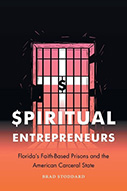Spiritual Entrepreneurs: Florida’s Faith-Based Prisons and the American Carceral State

Author: Brad Stoddard
Publisher: The University of North Carolina Press, 2021. 272 pages.
Reviewer: Erin Runions | December 2022
Spiritual Entrepreneurs provides an excellent account of the growth of faith-based prisons within the neoliberal prison industrial complex in Florida. Since the Florida Department of Corrections (DOC) does not make it very easy to get a full picture its faith- and character-based prisons, Brad Stoddard’s up-close, ethnographic and historical work is immensely helpful. This book provides the first and only full assessment of how Florida has led the way in conservative and neoliberal agendas that allow prison programs to be governed and funded by religious organizations and individuals. A complex picture emerges, in which compassionate conservatism continues to promote merciless tough on crime policies. Yet it also carves out gentler rehabilitative zones in prison for mostly conservative Christians and a small number of adherents to other traditions, all of whom are socialized into the rigid heteropatriarchy of the culture wars.
The book’s title is taken from the first inaugural address of Jeb Bush as Governor of Florida in 1999. Bush took the national lead in promoting partnerships between state and faith-based organizations. He exhorted, “Let us not be afraid to engage our churches and synagogues and spiritual entrepreneurs to enhance care for the needy and to fill the hollow hearts. State government can draw much from these reservoirs of faith” (p. 199). Stoddard persuasively details how following the lead of the Bush administration, Florida made use of “spiritual entrepreneurs.” Stoddard explores how “motivated by private religious convictions and market savvy, [spiritual entrepreneurs] would replace the government at the local level and throughout the state” (p. 199). Multitudes of Christian ministers and religious leaders from minority traditions, religiously motivated volunteers, and incarcerated people have donated time and money, created nonprofits, and started businesses to provide programming for Florida’s three full faith- and character-based prisons and thirty-two faith- and character-based prison dorms (p. 69, 97-100, 187-89). The Florida DOC avoids First Amendment suits by formally disallowing proselytizing, promoting religious pluralism, and including religious and secular (character-based) programming (p. 70). Nonetheless, the majority of religious teaching that occurs is conservative, Protestant Christian, and enforces ideas of individual sinfulness, salvation through Christ, personal responsibility, patriarchy, and heterosexuality.
The largest work of Spiritual Entrepreneurs is to show the neoliberal design and workings of spiritual entrepreneurship in faith- and character-based prisons. It is what President George W. Bush’s administration envisioned as “a quiet revolution” (p. 205, n. 4), in which private, compassionate conservatism would provide social services while the government would spend taxpayer dollars elsewhere (for instance, wars in Iraq and Afghanistan). It is worth pointing out that the architects of the U.S. quiet revolution were surely intentional about the use of the phrase, first used to describe the secularization of social services in Québec in the 1960s. Clearly advocates of the U.S. version wanted a reverse outcome. Stoddard details the history of how Florida reduced budgets in prisons without decarcerating, which created a vacuum into which faith-based organizations have stepped (p. 48-49, 201). As he indicates, this quiet revolution is both a neoliberal economic revolution, as well as a religious revolution and arm of the culture war.
Chapters one and two situate the emergence of faith- and character-based prison programs in Florida within the larger national push toward neoliberal growth of prisons. Chapter one shows the connections forged between the New Christian Right, culture wars ideology, Republican politics, and prison growth in Florida. During the late 1980s, the Florida DOC became increasingly punitive and expansive. Stoddard details how this shift was bolstered by Republican policy and Christian activism starting in the 1970s. Crime became a personal moral failing rather than structural inequity. The chapter sets the reader ups to understand that faith-based prison programming grows out of wide-spread conservative claims that a return to religious institutions and strong two-parent families could solve crime.
Chapter two details the emergence of faith- and character-based prisons in Florida. The chapter shows how these largely privately funded and staffed programs flourished alongside tough on crime policies. In 1991, DOC Secretary Harry Singletary dealt with a budgetary shortfall by treating corrections as a business and bringing in faith-based organizations to provide free labor, goods, and services. Then, during the time that Jeb Bush began ratcheting up tough on crime policies and incarceration, the Florida state legislature promoted the idea that crime could be ameliorated by faith. More faith-based dorms were created. Bush’s DOC Secretary, James Crosby Jr., ultimately proposed transforming some institutions fully into faith- and character-based prisons. In an interview, Crosby told Stoddard that he did so to reintegrate rehabilitation into Florida’s otherwise harshly punitive system. Three such prisons were established from 2002-2004.
Chapters three through six dive into the details that Stoddard gathered in his ethnographic work. Chapter three argues that faith- and character-based programs are tightly regulated, religious, and moral spaces funded by state government. The chapter argues that faith-based programs create stability by excluding those who do not fall within narrowly prescribed norms. Incarcerated participants follow strict guidelines of behavior on many levels of comportment, while religious leaders must be nonproselytizing and open to pluralism, even if they dominantly follow the norms of conservative Protestant Christianity. Chapter four shows that across institutions, the programs focus on attitudes, marital and family relations, life choices, mentoring, faith, and reentry. Chapter five explores the conservative ideology and theology that dominates in these institutions. Responses to gender, sexuality, race, and even labor relations not permissible in other state-run spaces proliferate in faith- and character-based prison programs. Chapter six analyzes just how much volunteers give to the programs, including considerable sums of money, material goods, free labor, reentry services, and a good deal of conservative theology and ideology.
Chapter five will be especially interesting to anyone interested in understanding the proliferation of the culture wars. Delving into specific teaching, Stoddard shows that faith- and character-based prison programs are a key component for the Christian Right’s project of politicizing family values while also furthering the logics of individual responsibility and harsh punishment that undergird the prison industrial complex. Drawing on the insights of Melinda Cooper, Stoddard argues that the insistent return to patriarchy predominant in the programs “serves the interests of neoliberalism, as it assumes that private and patriarchal authority is responsible for socialization and for administering the families that are increasingly conceived as the foundational units of social organization” (p. 151). These ideas about sociality feed into the notion that crime is caused by the breakdown of the two-parent family (as discussed in chapter one). At the same time, crime is considered first and foremost to be sin, and therefore ameliorated by faith, rather than radical intervention into racially inequitable social systems. Faith in this context then leads to the conservative theology that dovetails with neoliberal claims. Crime becomes an individual, family, or religious responsibility rather than caused by the very neoliberal economic policies and conservative patriarchal families that make life untenable for many people. Faith- and character-based prison programs, therefore, propagate the prison industrial complex and ensure their own continuance within that system.
In sum, this book provides a detailed and beautifully analyzed account of the largest faith- and character-based prison program in U.S. state prisons. It shows how conservative Protestant thought strengthens the neoliberal aims of incarceration as a financial and social strategy. Spiritual Entrepreneurs will be valuable reading for scholars, students, and activists seeking to understand the intersections of finance with the criminal legal system, the place of religion in shaping the prison industrial complex, or ideologies of sexuality and gender within the prison system. Finally, the material in these pages urges abolitionist activists and scholars to disrupt the circuits connecting conservative Protestant theologies, neoliberal/conservative family values, faith-based organizations, and punitive systems.
Erin Runions is Professor of Religious Studies at Pomona College.


